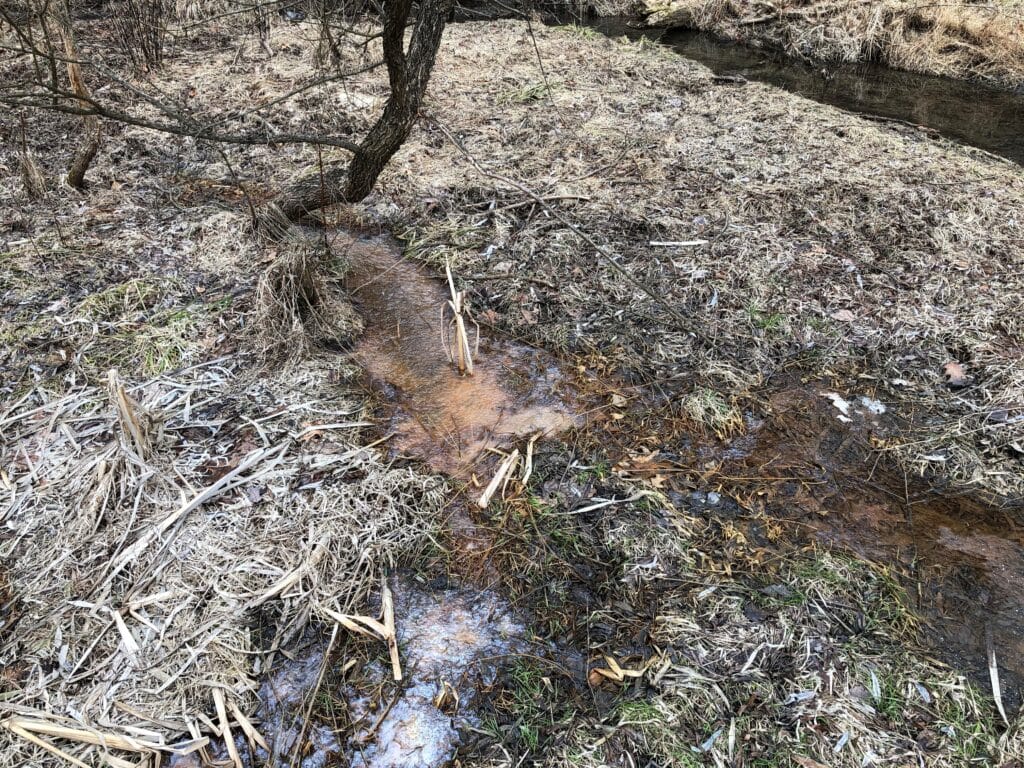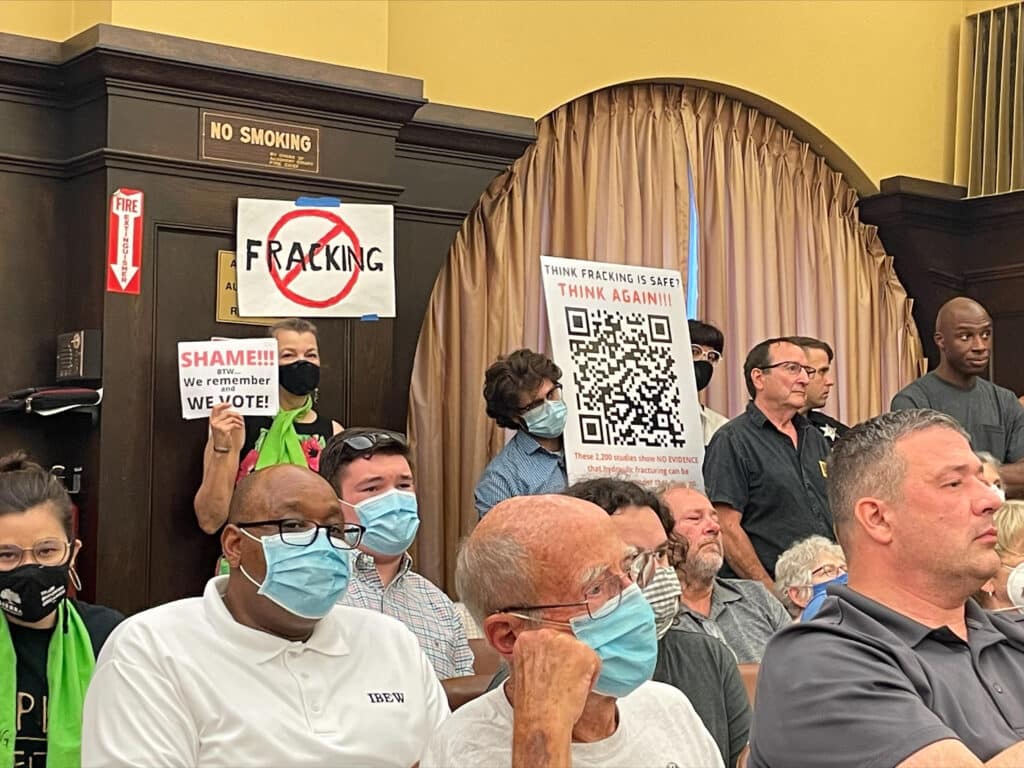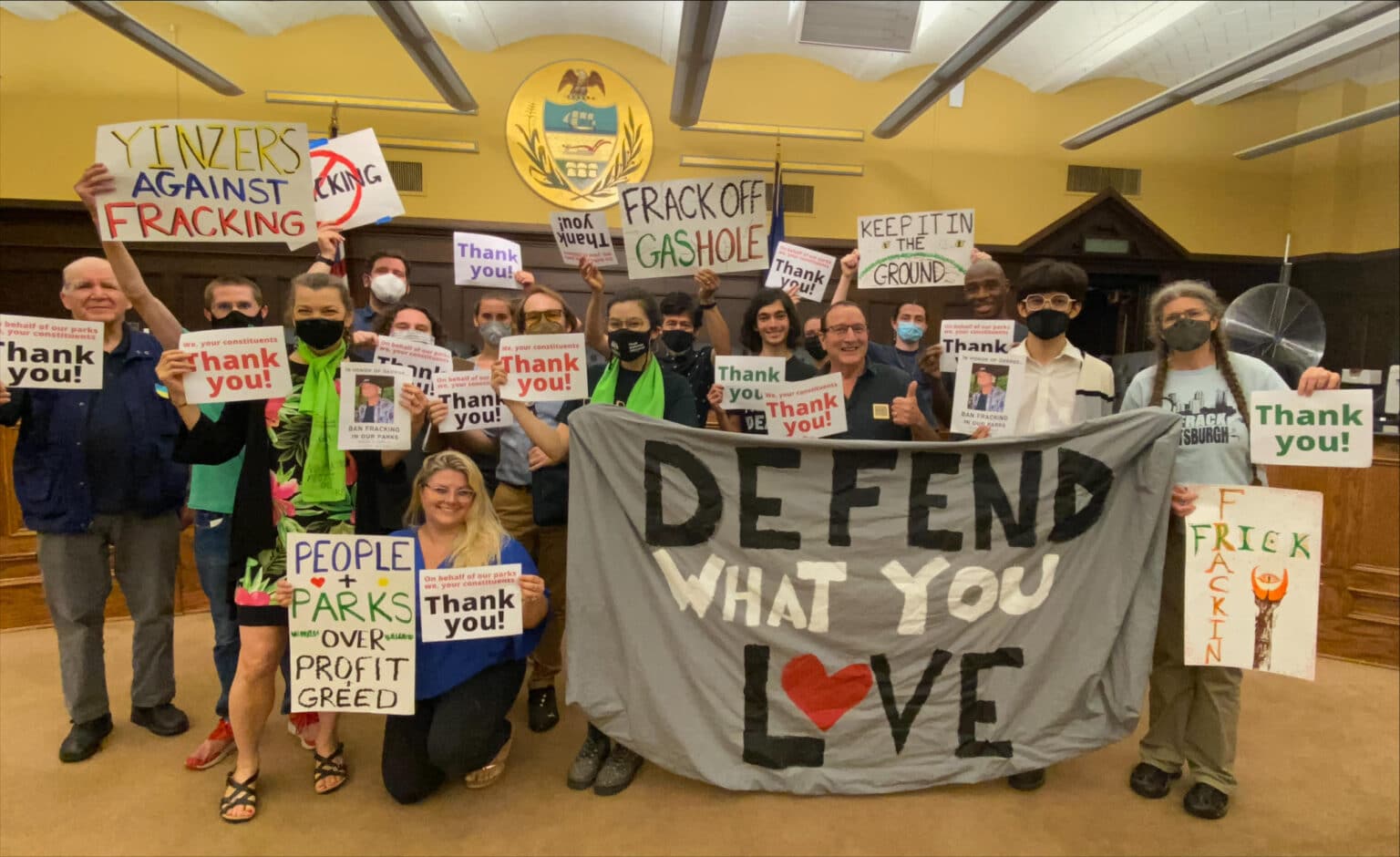Eight years after allowing a shale gas company to drill beneath Deer Lakes County Park for methane gas, the Pennsylvania county home to Pittsburgh has banned all industrial activity in the area’s eight other parks — despite a veto from the county executive.
It’s the first such move at the county level in the state, one fracking opponents term a milestone in a state where the fracking industry almost always gets its way.
The Allegheny County Council initially passed the measure on July 5 by an 11-4 vote. But County Executive Rich Fitzgerald vetoed the legislation, blasting it as “just propaganda.”
“Natural gas rights leasing should be conducted on a case-by-case basis by the leaders elected to make those decisions,” said Fitzgerald, a longtime ally of the natural gas industry, who also stated that he had “no intention of allowing any drilling related activity on or under any of our parks.”
However, a few days later the council voted to override Fitzgerald’s veto — and the ban even picked up a vote, making the final tally 12-3.
Councilman Bob Macey said he changed his mind after hearing from constituents who wanted the measure to pass. “I listened to my constituents,” he said, according to local media. “I got some phone calls, emails over the last week or so. I try to do the will of the people.”
Activists concur that the effort has broad support. “During our canvassing efforts, we heard from a lot of folks that said they supported drilling, just not in the parks. There’s this recognition that some spaces still need to be sacred and protected from industry,” Robin Lesko, a senior organizer with Food & Water Watch, told DeSmog.
“Given the county’s location in the Marcellus Shale, it sends a message that not everything is for sale,” she said, “and that just because you can, doesn’t mean you should.”
The Marcellus Shale Coalition, a lobby for the region’s fracking industry, denounced the move.
In a letter to the editor of the regional news outlet TribLive, Marcellus Shale Coalition president Dave Callahan and Tom Melcher, business manager of the Pittsburgh Regional Building & Construction Trades Council, responded to the ban by saying that natural gas development “is safe, well-regulated” and that the Deer Lakes Park fracking project is “just one example of the more than 10,000 unconventional natural gas wells that have been responsibly developed statewide.”
West Deer resident Tim Resciniti, who with his wife Jo organized Concerned Residents of West Deer (CROWD) in 2020 to oppose a local fracking project, took issue with the assertion that the industry has a solid track record of drilling responsibly over the past decade and a half.
“That just doesn’t match up with the facts. You can’t say it’s never harmed anyone. You can’t say it’s inherently safe,” he told DeSmog.
In 2014, Allegheny County signed a lease with Range Resources, allowing the company to drill beneath Deer Lakes Park. A 2019 water quality assessment of Deer Lakes Park by a scientist at Duquesne University documented the presence of chemical contaminants associated with fracking, offering evidence that in the lone instance where the gas industry drilled beneath a county park water was contaminated.

More broadly, scientists and environmentalists have documented a long list of negative environmental, health, and social impacts of fracking.
Resciniti, an engineer by training, also noted that Range Resources has previously been charged with environmental crimes by the state attorney general. The company pled no contest to the charges and paid a fine.
I shot this video in Deer Lakes Park. How many new benches or spruced up playgrounds make this worth it? https://t.co/vWGVX4TQEY pic.twitter.com/Q2d4JNjUlj
— Tim Resciniti (@TimResciniti) July 10, 2022
“To say that [gas drilling] has been going on for 15 years safely without harming anyone, it’s just demonstrably false,” Resciniti said.
A “Watershed in Pennsylvania’s Narrative Around Fracking”
Activists say the ban has pierced the methane gas industry’s image as an invincible force in Pennsylvania politics.
“If you look locally, the county executive and the industry are throwing everything they’ve got at this. And I think it is because they’ve got this aura of invulnerability and this is a crack in that myth of invulnerability. And they can’t let that happen,” John Detwiler, a volunteer with Protect Our Parks, a community group, told DeSmog.
He said that the industry packed local meetings and hearings at the Allegheny County Council with supporters at the last minute, in an effort to defeat the vote. However, “there was a huge outpouring of concern by county residents, both young and old, and that turned the tide in the short run,” said Detwiler. “The message that the residents were bringing was, this is not about having one wellpad in the park,” but “about fracking in general and what use the parks are to be put to.”

Although the ban only applies to a handful of parks in one county, and does not touch the vast supply of private land where the industry can drill, the precedent of a local government taking action is significant.
“It’s a ‘feet of clay’ kind of thing. Even though it’s a very, very small amount of acreage, the idea that someone could actually say no is what they are afraid of,” Detwiler said, referring to the gas industry.
Indeed, statewide polling does not back up the national political narrative that Pennsylvania voters are fiercely supportive of fracking and that any effort to regulate or enforce environmental laws risks political blowback.
Ben Hunkler, communications lead for the Ohio River Valley Institute, a local sustainable development think tank, pointed to recent polling showing more than half of Pennsylvania residents support an end to fracking, and even stronger majorities want stiffer regulation.
“The conventional wisdom is that most Pennsylvanians support fracking, but public opinion data verifies that this narrative is out of touch with on-the-ground attitudes in the Commonwealth,” he said. “Across demographics and political affiliations, fracking is unpopular with Pennsylvania voters, recent statewide polling shows.”
The “2022 Pennsylvania Climate and Energy Survey,” conducted by Muhlenberg College, found that roughly three in four residents favor mandating greater distances between drilling operations and homes, schools, and other buildings. More than 80 percent want stronger regulation on transporting fracking waste.
Hunkler called the vote to ban fracking in Allegheny County parks a “vindication of public will,” and a “watershed in Pennsylvania’s narrative around fracking.”
Allegheny County Council Member Anita Prizio, a co-sponsor of the bill, said the council heard the groundswell of support for the ban. “Public support for this ban was overwhelming and we listened!” Prizio said in an email to DeSmog. “As public servants we are obligated to preserve and protect lands not only for today but for future generations.”
“Our parks are designed to support healthy activities and be a place for recreation,” she added, “not a profit center for the already heavily subsidized natural gas industry.”
Subscribe to our newsletter
Stay up to date with DeSmog news and alerts







